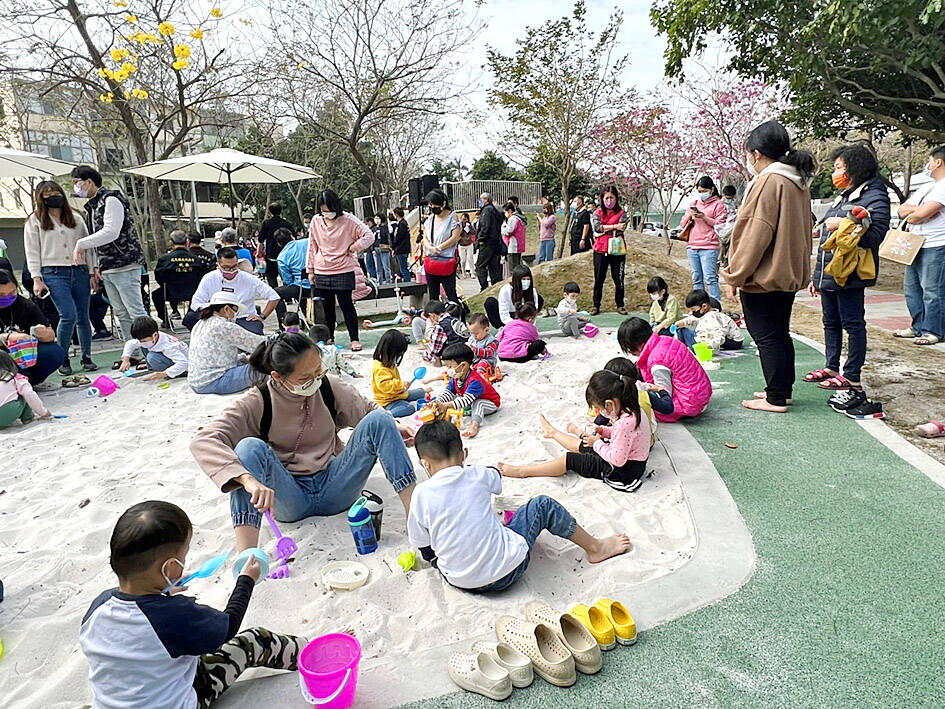Taipei has the highest proportion of residents who have dependents, at more than half last year, data released by the Ministry of the Interior on Monday showed.
It is also where the heaviest financial burden is placed on the “sandwich generation” — those who need to support at least one child and at least one parent.
The “dependency ratio” climbed to more than 50 percent in Taipei for the first time last year, meaning that for every two working-age residents (aged 15 to 64) there is one family dependent, defined as younger than 14 or older than 65.

Photo: Huang Shu-li, Taipei Times
The nation’s aging index is the number of people aged 65 or older divided by the number of people aged 14 and younger, multiplied by 100.
Chiayi County had the highest score in the index last year at 252.45, followed by Keelung at 196.12, Kinmen County at 196.01, Nantou County at 195.74 and Pingtung County at 193.08.
Keelung posted the biggest increase, rising from 184.22 in 2021, while Kinmen recorded the second-biggest increase, followed by Nantou.
In the six special municipalities, Taipei has the highest aging index at 166.1, followed by Kaohsiung at 161.78, while Taoyuan had the lowest score at 101.89.
Taoyuan still trailed Hsinchu City and Hsinchu County, which scored 87.03 and 86.71 respectively. The two regions are the only places in Taiwan where the younger population is bigger than the elderly population.
Regarding families that support elderly parents, Taipei surpassed Chiayi County, with a dependency ratio of 31.44 percent, up from 29.76 percent in 2021. Chiayi County’s ratio was 31.12 percent.
Hsinchu City has the highest dependency ratio for young people at 23.38 percent, followed by Hsinchu County at 22.27 percent and Taoyuan at 19.54 percent.
The lowest financial burden placed on the “sandwich generation” was in Kinmen County and other outlying islands, as they have the most social welfare benefits, subsidies and incentives for residents, ministry officials said.
Many people who are registered as living on outlying islands, work and live on Taiwan’s main island, so their dependency ratio does not reflect the actual situation and cannot be used for comparison, officials said.
House ownership in Taiwan has increased, while there has also been a growth in single-person households, which made up 35 percent of all households nationwide. It is the highest ratio in the nation’s history.
There were 3.22 million single-person households last year, 1.91 million two-person households and 1.64 million three-person households, a record high for all three.
A decade ago, single, two and three-person households totaled 770,000, 340,000 and 150,000 respectively.
Households of four or more people totaled 2.65 million 10 years ago, but dropped to a record low 2.31 million last year, or 25.4 percent of the nation’s total.
The number of four-person households ranged from 1.3 million to 1.34 million throughout most of the past decade, but dropped below 1.3 million in 2020 and plunged to 1.26 million last year.
The average household has 2.56 people living in it, also a record low.
This indicates that the traditional three-generation nuclear family is fast disappearing, officials said, adding that people registered in households might not be related, but the trend shows that the family composition of Taiwan’s population is changing.

The manufacture of the remaining 28 M1A2T Abrams tanks Taiwan purchased from the US has recently been completed, and they are expected to be delivered within the next one to two months, a source said yesterday. The Ministry of National Defense is arranging cargo ships to transport the tanks to Taiwan as soon as possible, said the source, who is familiar with the matter. The estimated arrival time ranges from late this month to early next month, the source said. The 28 Abrams tanks make up the third and final batch of a total of 108 tanks, valued at about NT$40.5 billion

Two Taiwanese prosecutors were questioned by Chinese security personnel at their hotel during a trip to China’s Henan Province this month, the Mainland Affairs Council (MAC) said yesterday. The officers had personal information on the prosecutors, including “when they were assigned to their posts, their work locations and job titles,” MAC Deputy Minister and spokesman Liang Wen-chieh (梁文傑) said. On top of asking about their agencies and positions, the officers also questioned the prosecutors about the Cross-Strait Joint Crime-Fighting and Judicial Mutual Assistance Agreement, a pact that serves as the framework for Taiwan-China cooperation on combating crime and providing judicial assistance, Liang

A group from the Taiwanese Designers in Australia association yesterday represented Taiwan at the Midsumma Pride March in Melbourne. The march, held in the St. Kilda suburb, is the city’s largest LGBTQIA+ parade and the flagship event of the annual Midsumma Festival. It attracted more than 45,000 spectators who supported the 400 groups and 10,000 marchers that participated this year, the association said. Taiwanese Designers said they organized a team to march for Taiwan this year, joining politicians, government agencies, professionals and community organizations in showing support for LGBTQIA+ people and diverse communities. As the first country in Asia to legalize same-sex

MOTIVES QUESTIONED The PLA considers Xi’s policies toward Taiwan to be driven by personal considerations rather than military assessment, the Epoch Times reports Chinese President Xi Jinping’s (習近平) latest purge of the Chinese People’s Liberation Army (PLA) leadership might have been prompted by the military’s opposition to plans of invading Taiwan, the Epoch Times said. The Chinese military opposes waging war against Taiwan by a large consensus, putting it at odds with Xi’s vision, the Falun Gong-affiliated daily said in a report on Thursday, citing anonymous sources with insight into the PLA’s inner workings. The opposition is not the opinion of a few generals, but a widely shared view among the PLA cadre, the Epoch Times cited them as saying. “Chinese forces know full well that